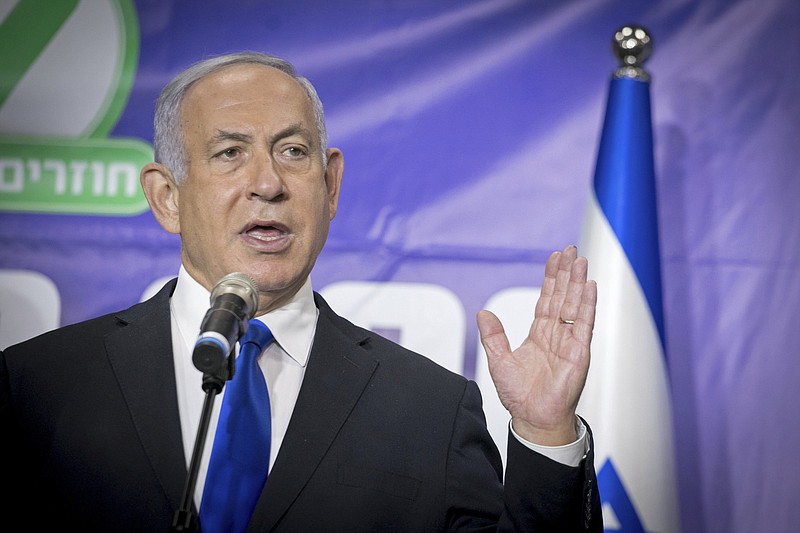JERUSALEM -- Israeli Prime Minister Benjamin Netanyahu called off a visit to the United Arab Emirates on Thursday, citing a diplomatic disagreement with Jordan, in a setback for his reelection campaign just days before the vote.
Netanyahu had hoped to use the audience with the UAE's crown prince -- their first public meeting since the countries established ties last September -- to boost his campaign ahead of the March 23 election. Instead, he is having to explain to the public why his trip had been called off and doing damage control to protect Israel's fragile relationship with the Jordanians.
Netanyahu's office said it had difficulties coordinating the flight over Jordanian airspace after Jordan's crown prince canceled a visit to the Al-Aqsa Mosque in Jerusalem, a sensitive holy site under Jordanian custodianship, due to disagreements over security arrangements.
Speaking at a news conference, Netanyahu said there had been a misunderstanding. By the time it was sorted out, he said it was too late to fly.
"I can fly through the skies of Jordan," he said. "Until it was coordinated, today's visit wasn't possible."
He said he had spoken by telephone to the UAE's crown prince, Mohammad Bin Zayed Al Nahyan, and they agreed he would visit "very soon." He also said the Emiratis informed him of plans to invest $10 billion in Israel.
There was no immediate comment from the UAE.
With Israel now locked in its fourth election campaign in two years, Netanyahu is once again trying to portray himself as an experienced statesman uniquely qualified to lead the country through its many diplomatic and security challenges.
One key pillar of that strategy, Netanyahu's close ties with former President Donald Trump, is no longer relevant now that a new administration is in the White House. But Netanyahu continues to point to Israel's agreements establishing ties with the UAE and three other Arab countries, all brokered by Trump, as among his proudest accomplishments.
Those agreements, however, have come at the expense of the Palestinians and neighboring Jordan, which after Egypt became the second Arab country to reach peace with Israel in 1994.
The immediate cause of this week's dispute stemmed from Jordan's role as custodian of the Al-Aqsa Mosque compound, the third-holiest site in Islam. It is also the holiest site for Jews, who refer to it as the Temple Mount, and has long been a flash point for Mideast tensions.
Jordan's Crown Prince Hussein bin Abdullah II had planned to visit the mosque to pray on the Muslim holiday marking the Prophet Muhammad's ascension to heaven from the site. But he turned back at the border due to a disagreement with Israeli authorities over the number of armed escorts that could accompany him, Israeli media reported.
Jordan's foreign minister, Ayman Safadi, accused Israel of changing agreed-upon arrangements "at the last minute" and forcing the crown prince to call off the visit.
"His highness decided he did not wish to disrupt this peaceful night of prayer," Safadi said at a Paris summit. "We cannot accept Israeli interference in the affairs of Al-Aqsa."
Oded Eran, a former Israeli ambassador to Jordan, said the spat reflected a deeper deterioration in relations in recent years.
"The major problem is there is no dialogue between the No. 1's in Jordan and Israel, that is to say between the prime minister and the king of Jordan," he said.
That lack of trust was highlighted by Israel's plans last year to annex parts of the Israeli-occupied West Bank. Israel suspended the annexation plan as part of its agreement to establish ties with the UAE, but Eran said the Jordanians remain deeply suspicious.
Meanwhile, leading European and Arab world diplomats announced potential "small steps" Thursday toward reviving Mideast peace efforts after the upcoming Israeli and Palestinian elections.
The officials -- from the U.N., European Union, Egypt, Jordan, Germany and France -- did not release any specific details, however. And the meeting came amid new tensions between Israel and Arab countries around Jerusalem.
There have not been any serious Israeli-Palestinian peace talks in over a decade and it is unclear what the diplomats can do concretely to create conditions to bring the two sides closer together, especially without the participation of the U.S.
The Biden administration has called on both sides to refrain from unilateral steps that could harm peace efforts but has yet to announce any major effort to resolve the decades-old conflict as it focuses on the coronavirus, the economy and other domestic issues.
Information for this article was contributed by staff members of The Associated Press.
